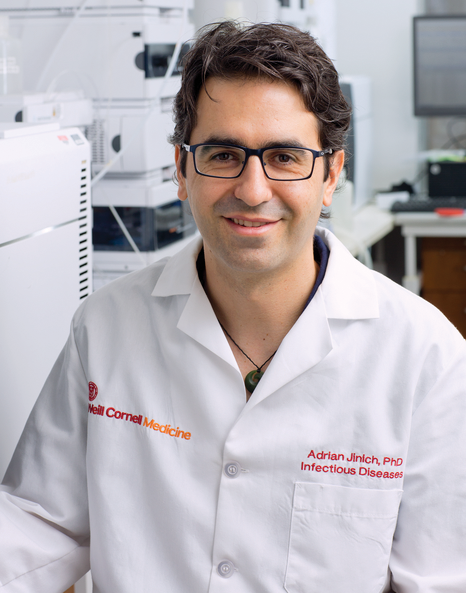Dr. Adrian Jinich, a postdoctoral associate in medicine in the Division of Infectious Diseases at Weill Cornell Medicine, has been selected as a 2019 Hanna H. Gray Fellow by the Howard Hughes Medical Institute (HHMI).
Dr. Jinich is one of 15 early-career scientists in the United States selected for this prestigious program, which aims to recruit and retain individuals from gender, racial, ethnic and other groups underrepresented in the life sciences. Hanna H. Gray Fellows receive up to $1.4 million over the span of eight years – for the remainder of their postdoctoral training and also during their early years as independent faculty. The program also includes mentoring opportunities and active involvement in the HHMI community.

Dr. Adrian Jinich. Credit: John Abbott
“I’m thrilled I was selected to be a fellow,” said Dr. Jinich, who works in the immunology and microbial pathogenesis lab of Dr. Kyu Rhee. “It’s a great honor to be part of this fellowship because it seeks to increase diversity in science, and this mission resonates strongly with me.”
For his doctorate, Dr. Jinich studied the energetics of metabolism, the biochemical reactions in cells that help them convert nutrients from the environment into energy and cellular building blocks. As a postdoc, he wanted to apply what he learned to “a real-world global challenge,” he said, focusing on tuberculosis, the leading cause of death from a single infectious disease in the world. His research involves uncovering the currently unknown function of a large fraction of the TB bacterium’s genes, many of which are thought to encode enzymes involved in metabolism.
“Metabolism is important for bacterial pathogenesis and the better you understand the bacteria’s metabolic network, the better position you are in to design drugs that target its vulnerabilities,” Dr. Jinich said.
Dr. Jinich has always been interested in the sciences, but growing up in Mexico City, he encountered limitations when it came to science education in schools there, he said. So as a graduate student at Harvard University, he co-founded a program called Clubes de Ciencia Mexico – or “Science Clubs Mexico” – to help bring quality science education to students in his native country. As part of the program, doctoral students and postdocs from the United States and Mexico teach one-week intensive workshops to high school and college students in Mexico.
“Dr. Jinich is as passionate about sharing science as he is about learning it,” said Dr. Rhee, an associate professor of medicine in the Division of Infectious Diseases at Weill Cornell Medicine. “It’s a privilege to be able to contribute to the training of someone as talented as him, who is motivated to make an impact on society through science. This fellowship is particularly important because it seeks to empower people by making science a universally accessible resource irrespective of background.”

